A great mix of old and new cinematic gold, this year's lineup includes Ildikó Enyedi’s Berlinale Golden Bear-winner On Body and Soul; Mrs. Fang, Wang Bing’s unflinching document of an elderly woman in her final days, which won the Golden Leopard at Locarno; the North American premiere of Katharina Wyss’s powerful debut feature Sarah Plays a Werewolf, about a woman who channels her fears into theater; Govinda Van Maele’s fiction feature debut Gutland, featuring Phantom Thread’s Vicky Krieps; the U.S. premiere of Slovenian director Rok Biček‘s The Family, a compassionate portrait of a young man’s life over the course of 10 years; and experimental artist Bertrand Mandico’s exhilarating, gender-bending Wild Boys.
The series opens with US premiere of Life and Nothing More, a moving docu/fiction hybrid by Antonio Méndez Esparza.
The Series runs Friday, February 23 through Tuesday, February 27. Please visit FSLC's website for tickets and more info.
Here are six films I was able to sample:
Wild Boys/Les garçons sauvages - Bertrand Mandico
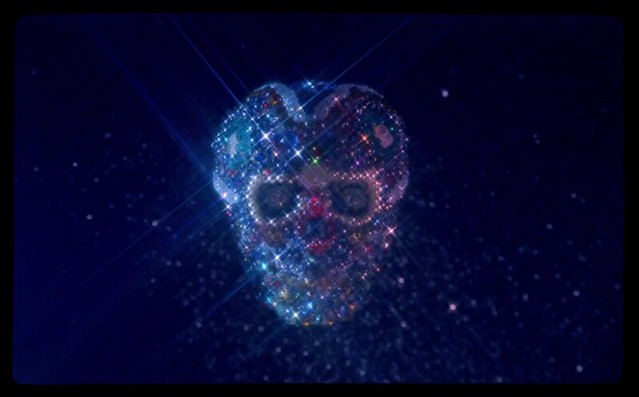
Five handsome boys from an exclusive boarding school go a little too far with their sexual desire with their literature teacher, reaching a state called 'Tresór,' symbolized by a jewel-crusted skull. As a punishment, they are cast away by a greasy, bearded ship captain (Sam Louwick) with a gigantic tattooed penis. Chained and fed only a fruit that resembles hairy balls, the boys go through a harrowing sea voyage under the ruthless captain. The ship is headed toward a mysterious island where men turn into the fairer sex. The idea is, taking a short trip to the island might make these wild lusty boys a little more even tempered, a little less testosterone filled.
Bertrand Mandico makes a feature debut after many fantastical, colorful, playful shorts with the crazy beautiful The Wild Boys. He flips gender roles, having the roles of the boys played by female actors (Vimala Pons, Pauline Lorillard, Diane Rouxel, Anaël Snoek and Mathilde Warnier) in ties and suspenders with short hair. After they get to the seemingly wild and unkempt island full of weird vegetation that resembles secreting penises and hairy balls (their only means of sustenance), they meet Dr. Séverin(e) (Mandico's muse Elina Löwensohn), a zoologist who became a woman after he landed on the island. One of the boys, Hubert (Rouxel) gets left behind with Séverine and the rest go back to the ship due to the captain's urging. But soon the boys revolt against the captain because they want to go back to the weirdly seductive island. The boat capsizes in the storm, and the boys end back up on the island.
A gaudy, sensual, daring and inventive take on both Goto: Island of Love by Polish master Animator/filmmaker Walerian Borowczyk and Lord of the Flies, The Wild Boys is a lot of fun. It plays out like a prettier, sexier Guy Maddin film. And its pan-sexual theme is not without a dash of humor. The beach fight/orgy scene complete with flying feathers and sand alone is worth the price of admission.
The Family - Rok Biček
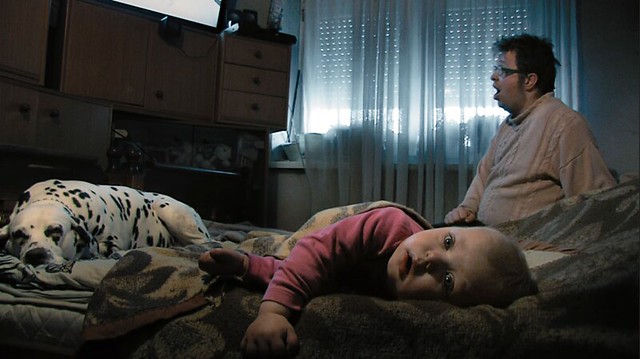
Rok Biček's non-judgmental, uncompromising Slovenian documentary follows young Matej's troubled life for a decade. It shows that the life is very complicated and not at all black and white.
In a jumbled timeline, we first see the graphic moments of Nia, Matej and his girlfriend Barbara's daughter, being born. They both are teenagers at this point. They move in with Barbara's parents'. It seems Matej has a strong bond with Barbara's dad. But their domestic bliss is very short-lived. We see teary Matej moving out and back into his parents'. It is quite easy to see why Matej seeks his parental love elsewhere- with a mentally challenged brother at home, his parents are not quite the nurturing types- uneducated and lost control over Matej long ago, their communication is limited to slurring words, yells and insults. But it's not like his parents are monsters. Dealing with a teenage son who is glued to his computer screen and completely shut out of his world, his parents deal with issues like any other parents of teenagers in the world.
A session with the with a school councilor reveals this dilemma. The councilor points out to Matej's dad that his son is quite bright, yet his has learning disabilities and has some behavioral issues. Dad tells her that he is doing all he can to help him. And the councilor reminds Matej that his parents 'doing all they can' might seem not enough under their circumstances, but that doesn't mean they don't love him.
As the custody battle over Nia ensues, Matej seeks vasectomy. He doesn't want to get a girl pregnant. And the sensation is not the same with condoms, he explains to the doctor. His application is denied because he's only 23. He gets involved with a 14 year old school girl and gets heavily dependent on her kindly mother.
With titling the film, The Family, Biček deliberately provokes us to examine what it means in the current complicated, messy world we are living in. There are numerous gaps in the timeline and important events in Matej's life we are missing out- his father died, how? What happened to his front teeth? It's that truncated history that gives the film its punch. Life goes on, whether we are watching or not. The film ends with young Matej snarkily asking, looking directly into the camera "Isn't my life interesting?" Yet the film's theme goes way beyond its mere subject.
Gutland - Govinda Van Maele
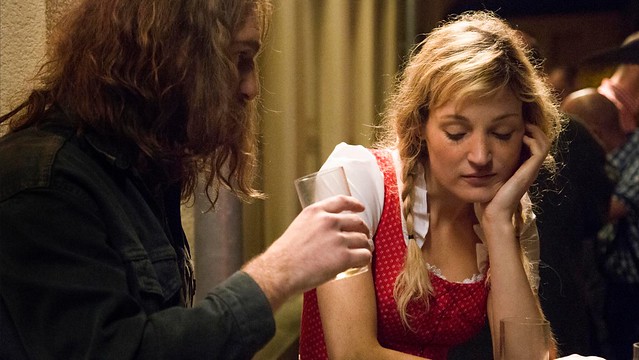
Starring pre-Phantom Thread Vicky Krieps, Gutland is a solid first feature from Luxembourgian director Govinda Van Maele. It's a slow burner that ultimately doesn't really pay off. It doesn't have a moral lesson or big revelatory ending. But it's all about maintaining that below-the-surface tension all throughout- Van Maele and co. do it very well with the help of effective dream/fantasy sequences and uneasy score.
It tells a story of a brusque German bank robber Jens (Frederick Lau) with a bag full of cash rolling into a rural farming community in Luxembourg. In order to lay low, Jens looks for a job as a farmhand for the harvest season. At first suspicious, the townsfolk warm up to the caveman-like Jens, especially Lucy (Krieps), the daughter of the towns mayor. A town's elder, the pillar of the community takes a liking to him. He warns him ominously of one thing though - do not get involved with any of the wives here.
Jens settles in with Lucy, making his stay semi-permanent, having a tranquil life. All the while, he has to deal with dirty secrets of the village, his own past and the bag full of money he buried in woods nearby. Is Jens a different man now he cut his caveman hair and beard off and plays in the town's orchestra? Is his second chance in life voluntarily asked for or forcibly given?
Gutland is an expertly crafted noir where you can't shake off that ominous feeling from beginning to end.
Life and Nothing More - Antonio Méndez Esparza *Opening Night Film
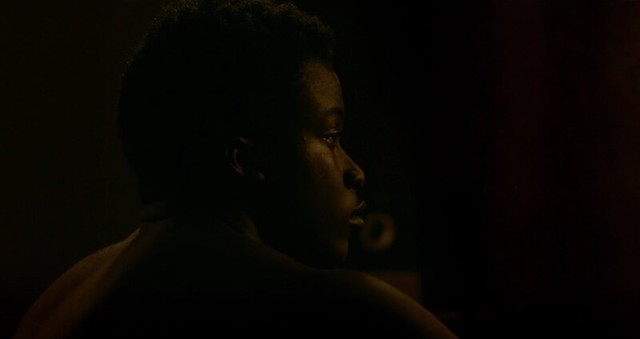
Falling somewhere between Roberto Minervini films and Florida Project, Life and Nothing More, directed by Antonio Méndez Esparza (Aqui y allá), brims with authenticity and empathy. If you were going in cold feet like me, the film is an extremely intimate documentary about a troubled teenager Andrew (Andrew Bleechington) and his overworked, but tough single mom Gina (Regina Williams). But a halfway through, you notice improvable, almost impossible camera placements in public places without being noticed and hear voice overs when they read letters. Then you realize that this isn't a documentary.
First, the focus is on Andrew, a quiet high school kid trying to stay out of trouble and taking care of his little sister while mom is at a diner working. He is bombarded from all sides (community groups and churches) that he needs to be good. Yet he is still a teen, trudging through a rough school and crime ridden neighborhood. With his dad incarcerated, he builds up his anger inside him. Then we shifts focus on to Gina and her budding romance with one of her customers, Robert (Robert Williams). She's done with men and doesn't have time for any bullshit. But very insistent Robert seems like a genuinely nice guy. What Andrew thinks of him is another matter though.
As it develops into a courtroom drama, the film charts a familiar territory - poverty, absent fathers, the inadequate, racist justice system, etc. But perhaps this uninspired story arc is the point - with little choices these characters have under the circumstances, this is how it plays out, just like in real life.
Quietly moving and beautifully portrayed by non-actors, Life and Nothing More is another moving, very human docufiction experiment about marginalized Americana.
*The California Film Institute's CFI releasing will theatrically distribute the two-time Spirit Awards nominee nationally this spring (TBA date). Award-winning filmmaker Antonio Méndez Esparza who is also a Guggenheim Fellow and professor at Florida State University will be in New York this week for the NY premiere screening and also participate in a Film Comment Free Talk on Race and Representation on 2/24.
On Body and Soul - Ildikó Enyedi
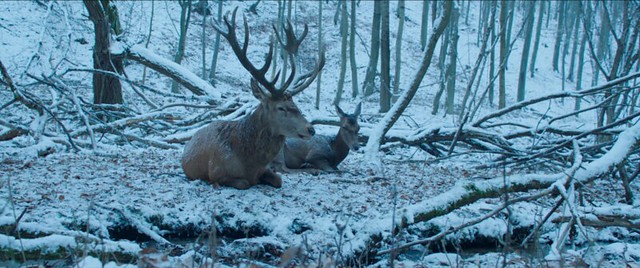
A handicapped, lonely and aging financial director, Endre (Géza Morcsányi) at an industrial slaughterhouse is intrigued by Maria (Alexandra Borbély), a new quality inspector who lacks any social niceties. It happens that they dream the same dream every night - that they are a deer couple, roaming the snowy forests, enjoying each other's company in silence. But even though they share the serendipitous events, unlike a regular romance, they have some big huddles to leap through - Endre has given up his love life a long while ago and Maria suffers from haphephobia for whatever reasons.
Hungarian director Ildikó Enyedi (My Twentieth Century) does whimsy right while contemplating all animals as sentient beings. On Body and Soul is a grown-up fairytale (as opposed to grown-up's fairytale). I liked that Enyedi doesn't rely on cuteness of the premise. It's mature and beautifully realized. I hate when a film makes sex as a clutch that solves every problem its characters have. Even though Maria's characterization is shorthanded, I loved the idea of her ethereal being coming down to earth by her elopment with Endre, realizing the love is accepting breadcrumbs on the table.
Sarah Plays a Werewolf - Katharina Wyss
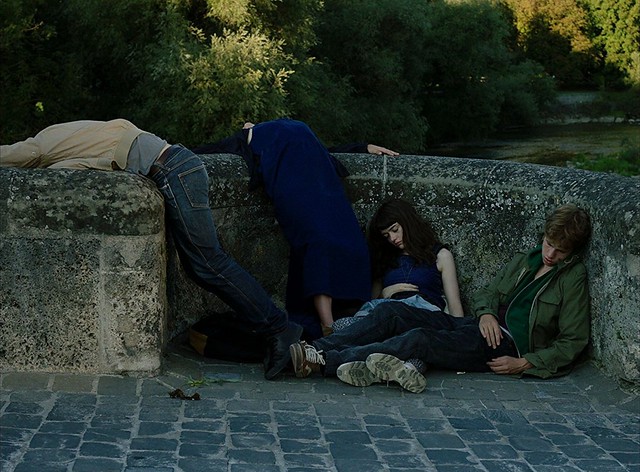
Sarah Plays a Werewolf paints a complex picture of what being a teenage girl is like. Sarah (Loane Balthasar) is a High School drama student in a picturesque Swiss town. She has a nice, well adjusted family - parents are well educated, cultured intellectuals & siblings are normal. Sarah has a penchant for dramatics - loving tragic figures in plays and opera, telling classmates that her imagined boyfriend is dead and Ben, her older brother who recently moved out to attend college, committed suicide even though he's alive and well. She doesn't have any friends or someone to talk to. It doesn't help that her parents are way too liberal with their parenting, encouraging her freedom in every which way, even condoning the thought of suicide. She and her Georges Batalle reading classmate Alice stage dramatic scene where Sarah plays a victim to Alice's torturer. Everyone, except for the drama teacher (Sabine Timoteo), is nonplussed and soon after Sarah loses Alice to a boy. She tries to make out with some of the boys but that doesn't work out either.
Sarah becomes more and more withdrawn and have schizophrenic episodes, until she attacks one of the student on stage. But her father refuses to medicate her or send her to therapy. "No one understands me," she keeps on saying.
Moody and melancholic, Sarah Plays a Werewolf is a clear eyed examination of being a teenage girl that reminds me of Bresson's films, especially Four Nights and a Dreamer and A Gentle Woman. Loane Balthasar's fearless performance is remarkable.
Mrs. Fang - Wang Bing
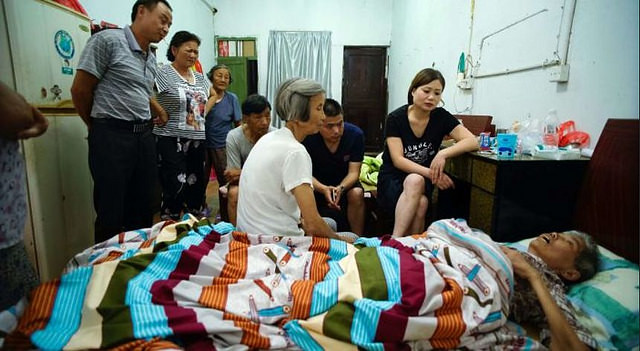
Mrs. Fang - Wang Bing
Death, the inevitable. It comes to everyone. It is part of life. We experience it more as we get older. But it never gets any easier. Wang Bing, the master chronicler of the shadowy side of Chinese economic boom, unflinchingly move forward with documenting an elderly woman's process of dying. Think of Mrs. Fang as real life version of Haneke's Amour, only less dignified and less poetic, just like death in real life.
We see Mrs. Fang, a plump, elderly lady silently looking in a dingy room. Six month later, she is skin and bones, unrecognizable, her teeth exposed, dying of Alzheimer's in the bed in a room she once looked in. Her family and friends flood the room looking in her condition. They argue loudly about the cost of her care, the funeral arrangement and her state of mind. As usual, through the series of long takes, we are confronted with a person dying in close up - her eyes staring nowhere, no voice and almost no mobility. People around her don't know about death, less about the Alzheimer's. They speculate endlessly in front of the dying woman.
Just like his other films, Wang depicts the rural, poor community. They are small fishing community. But there is no romanticism portrayed - they go off on their small metal fishing boat, cast the nets which makes buzzing sound, pull them in and come home.
Just who Mrs. Fang was is not Wang's concern to show. What she did, whom she loved is beside the point. The banality of death is. It's difficult to watch. Wang faces it head on. I admire that.
No comments:
Post a Comment